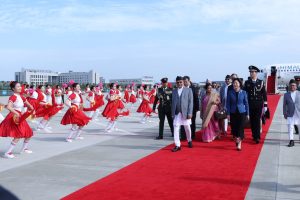Nepali Prime Minister K.P. Sharma Oli’s visit to China was intended to clear the air on a border dispute and project Nepali diplomacy on the global stage at the Shanghai Cooperation Organization (SCO) Summit. Instead, it got bogged down in twin controversies: Lipulekh and the Global Security Initiative (GSI).
Recently, India and China agreed to reopen a trade route through Lipulekh pass, which lies near the India-China-Nepal trijunction, without consulting Kathmandu. Nepal has historically claimed sovereignty over the area.
In response, Nepal dispatched diplomatic notes to both Beijing and New Delhi, expressing its displeasure. This was before Oli left for the SCO Summit in China. After this, the Nepali prime minister was expected to strongly raise the issue with Chinese President Xi Jinping during their bilateral meeting in Tianjin.
According to members of the Nepali delegation travelling to China with Oli, he strongly objected to the reopening of the pass without Nepal’s consent with Xi. The Nepali prime minister informed the Chinese president that Lipulekh has been Nepali territory since 1816, when the Sugauli Treaty was signed between Nepal and British India.
But then the Chinese statement released after the Oli-Xi meeting on August 30 made no mention of Lipulekh being discussed at the 20-minute meeting. Oli’s entourage maintained this was only natural as the Chinese side would talk up their own priority — and Lipulekh is not a Chinese priority.
China also seemed to be in no mood to “take sides” in the Lipulekh dispute at a time its ties with India are on the mend. After hearing Oli, President Xi Jinping replied that Lipulekh is a “bilateral issue” to be settled between Nepal and India. Oli’s critics feel the prime minister failed to emphasize Lipulekh’s importance for Nepal.
Then there was the Global Security Initiative.
Following his meeting with Xi, the Chinese Foreign Ministry put out a statement saying that Kathmandu recognizes China’s GSI, which is seen in Nepal as a Chinese security construct brought to check U.S. military might.
China has long sought Nepal’s support for the GSI as well as two other signature initiatives of Xi: the Global Civilization Initiative (GCI) and the Global Development Initiative (GDI) — plus the newly minted Global Governance Initiative (GGI). Nepal has been open to supporting such initiatives, with the exception of the GSI.
Nepali officials say it is “fake news” that Oli has expressed his support for the GSI. They maintain that there has been no change in Nepal’s old stand that it will not back any security-related alliance or initiative. It was on the same basis that Kathmandu had in the past refused to be a part of the U.S. Indo-Pacific Strategy (IPS), the State Partnership Program (SPP), or even the BIMSTEC military exercises.
But while those close to Oli deny the support for the GSI, Nepal has yet to officially reject the Chinese claim. By not rejecting Beijing’s claim, Kathmandu risks confirming it by omission. Perhaps this was because with its prime minister yet to attend the SCO summit (August 31-September 1), the Nepali delegation in China did not want to cause any friction with the hosts. But by keeping mum, Nepal risks antagonizing its important partners like India and the U.S., both of which see the various Chinese initiatives as means by which China is looking to strengthen its hold in Nepal.
It did not help that during his China trip, Oli appeared overeager to please the Chinese.
Initially, China had invited President Ramchandra Paudel to take part in the SCO summit. But he had declined the offer. This was because while extending the invitation for the summit, the Chinese also wanted Paudel to be a part of a parade in Beijing marking the “end of Japanese aggression” in China. The Nepali president thought it unwise for a ceremonial head of state to take part in an event with such heavy political overtones. Moreover, Japan has traditionally been among Nepal’s most generous and trusted donors and friends.
So, the invitation was then passed on to Oli, who readily agreed to be part of both the SCO summit and the parade. Oli’s eagerness seemed pliant compared to Paudel’s principled stand. Although Japan has not expressed its displeasure publicly, it is clearly unhappy with Oli’s participation in the “anti-Japan” event.
Back in Nepal, Oli’s China trip will be seen as a missed opportunity to get a clear Chinese commitment to recognize Nepal’s sovereignty over Lipulekh. China’s non-committal stand on Lipulekh will strengthen the Indian position that there is nothing to talk about regarding a trade route through which they have been trading with the Chinese on and off since 1954.
Abroad, Oli’s latest trip north will be taken as an instance of yet another communist prime minister from Nepal desperately trying to please China. Nepal’s failure to swiftly shoot down the Chinese statement on the GSI and its prime minister’s presence at the Beijing military parade will fuel the perception that this Nepali government is more partial to Chinese interests than it is to the interests of its other friends near and far.
A diminished standing at both home and abroad was certainly not the outcome Oli expected from his China trip.

































